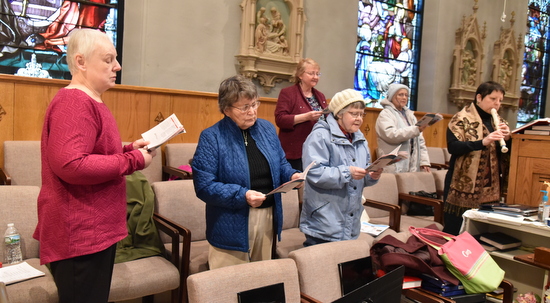Choir members preserve their heritage while praising God
“Venez a moi,” “C'est le moi de Marie,” and “J'Irai la voir un jour.” It is hymns like those that welcome parishioners and give praise to God each Sunday at St. Joseph Church in Biddeford. The 8 a.m. Mass at the church is celebrated in French or, at times, in French and English but always with music provided by a dedicated group of parishioners who make up Good Shepherd Parish’s French Choir.
“I think it adds something special to the Mass every Sunday,” says Anita Cote, an extraordinary minister of holy Communion, who serves at the Mass.
“I think by singing in French, we get the people to join us, and we give them the beauty of singing,” says Priscille Laliberte, a choir member.
The roots of the Catholic Church in Biddeford and Saco can be traced to the Irish and French-Canadian immigrants who came to work there in the mid-1800s. St. Mary of the Assumption Church, first known as St. Mary of the Immaculate Conception, originally served the entire community, but as the French-Canadian population grew, a new parish, St. Joseph, was established in 1870. With the mills along the Saco River prospering, St. André Parish in Biddeford followed in 1899 and then Notre Dame Parish in Saco in 1929.
Back then, French was commonly heard both in homes and in the churches, and while that is not as often the case today, members of the French choir say they are committed to keeping their heritage alive through the gift of their music.
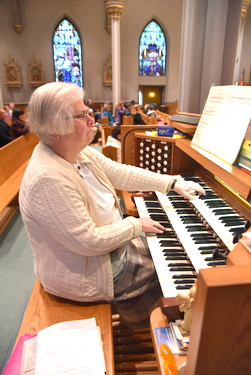 |
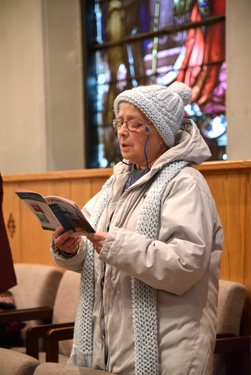 |
“We’re the only French Mass in York County, but there are a lot, a lot of French Catholics here, and it’s a way for us to be proud of our heritage and maintain it. Our French-Canadian parents built these churches. The French-Canadians built St. Joseph Church. They built St. André Church, and we’re proud of that, and we want to keep that relationship to our ancestry alive,” says Helene Fortier, music director of Good Shepherd Parish and the organist.“It just brings back so many memories for me. We were taught to speak French at home, and our parents, I think, would be really happy to see us here because we’re continuing that tradition and bringing back what we were taught when we were young. For me, it’s a thrill,” says Paula Bedard, a choir member.
Most of the 11 choir members have been singing for years, although not always at St. Joseph. In fact, the French choir actually got its start at Notre Dame Church. When Monsignor Rene Mathieu became pastor there in 2004, he discovered there was no music at the French Mass, so he approached parishioners about forming a choir. When Notre Dame closed in 2009, the French Mass shifted to St. Joseph.
“My husband and I have always been involved in liturgical music, and my daughter as well, and there was a need for musicians and singers at that Mass, so we went, and when the Mass came over here, it was just the continuation of our fellowship, so we all came,” explains Louise Berthiaume, a choir member.
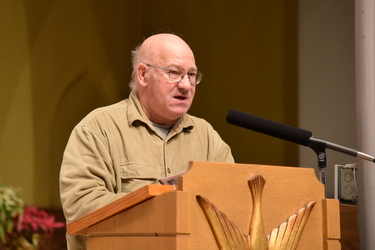
“To me, it’s a great symbol of the how the clustering has happened over the past few years,” says Helene, who played the organ at Notre Dame, in addition to St. Joseph.
The choir members get together to practice one evening every two weeks, in addition to singing on Sunday mornings. Although some members are advancing in years and some have battled ailments, they are rarely absent.
“They’re faithful. Even in the dead of winter, they come. Cold, ice, they come,” says Helene. “They’re a little older, and all of them have had their physical deterrents, but they come. They’re very devoted to this.”
“It’s a little challenging at times in the winter, but it’s great. It’s like a social gathering,” says Claudette Perreault.
The members say they enjoy participating in the choir because of a love for singing and an appreciation for what music can mean to the liturgy.
“When you sing the words, it makes you think twice about God, what He means to you. It means a lot to me because you’re praying twice doing that,” says Priscille. “I really love singing, and when I can’t make it, I’m not happy.
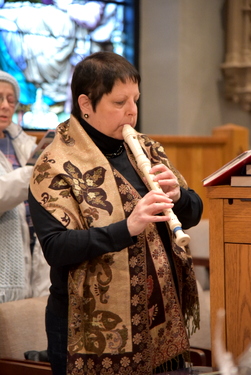
“I just like to sing, to keep the tradition going,” says Madeleine Boucher, who has participated in choirs since the 1970s.
“It completes the liturgy. It makes it richer. It makes it deeper. It makes it more spiritual I think,” says Louise.
Helene says she is always careful in the hymns she selects.
“You choose hymns that are pertinent to the readings, pertinent to the liturgical season, and if the people, God willing, choose to open their hymnals and sing along, hopefully those words will touch them,” she says. “Our job is to point towards Jesus, to point toward the altar, that tabernacle, that word that is spoken. That is our job. We’re not here to perform. We’re here to enhance prayer and to lead the way to Jesus.”
Members of the choir say there is great camaraderie among the group, so much so that they’re disappointed when something keeps them from getting together.
“We’re very friendly, and I love that, and then, when I don’t come, I miss them all,” says Priscille.
“It’s like a family for me. It’s like a family. I’ve been in a choir since grammar school because I’ve always loved singing,” says Claudette.
“We enjoy it when we meet every other Monday. We rehearse. We laugh. We are family to one another. I’m not necessarily a musical perfectionist, but Jesus calls us to relationship, and I feel really strongly about that,” says Helene.
“They’re the greatest. I love them. They’re very friendly, and our choir director, you can’t ask for a better person,” says Madeleine Lakin. She’s always there for us no matter what, encouraging us, always a smile on her face. She is the best.”
.JPG)
Dozens attend the French Mass, including some who don’t speak the language. They say they appreciate what the choir brings to their celebration.
“The French choir certainly enhances our Mass, and I’m always impressed by their age, that they’re here singing. They really sing beautifully,” says Sister Madeleine d’Anjou, SCIM, who serves as a reader and as an extraordinary minister of holy Communion.
“I do appreciate that we still have a sense of our French background, that we still have a French Mass and some good singing going on,” says Anita Cote. “I enjoy it tremendously.”







